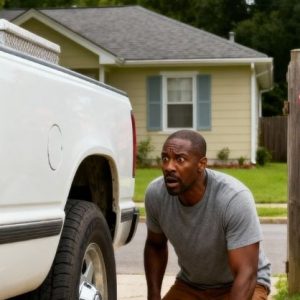
“Excuse me, sir. Are you lost?”
The words came sharp and cold, slicing through the still afternoon air.
Dr. Samuel Greer paused halfway down the tree-lined sidewalk of Maple Hollow, a quiet neighborhood tucked just outside Portland. His cane rested against his leg as he turned to face the woman who had spoken. She stood in front of him, arms crossed, her tone as rigid as her posture.
It was Karen Dupont, the president of the Maple Hollow Homeowners Association. Everyone knew her as the enforcer of neighborhood “standards.” She had sent warnings for leaving garbage bins out too long and once fined a resident because their front door paint was the wrong shade of blue.
“I live here,” Samuel said calmly, pointing toward a cedar house at the end of the street. “Number forty-three. Moved in earlier this year.”
Karen’s eyebrows lifted behind her designer sunglasses. “That house? It sold for nearly one point four million dollars. Are you sure you’re not visiting someone?”
Her voice carried a faint, deliberate pause. Samuel’s simple clothes and weathered face did not fit her idea of a homeowner in Maple Hollow.
“I’m sure,” he replied.
Karen gave a tight smile. “Well, I just hope you understand that we maintain a certain image here. Maple Hollow isn’t really for people who are, you know, struggling to keep up. We have expectations.”
Samuel’s expression stayed calm. “Thank you for the reminder,” he said, and continued walking home.
As he passed, Karen whispered under her breath, “This neighborhood isn’t for the poor.”
She did not know that the man she had just insulted would soon change everything in Maple Hollow.
That Friday evening, the monthly HOA meeting filled the community clubhouse. The long table gleamed under the lights, surrounded by homeowners chatting in low voices. Karen sat at the head of the table, her folder of notes stacked neatly in front of her.
“The pool renovation,” she began, “will cost just under two hundred and twenty thousand dollars. Unless we raise dues by fifteen percent, we simply cannot afford it.”
Murmurs spread through the room. Nobody wanted higher dues.
Then Daniel Brooks, the treasurer, adjusted his glasses and spoke up. “Actually, we received a private donation this week. It more than covers the cost.”
Karen looked confused. “A donation? From whom?”
Daniel flipped through his papers. “From Dr. Samuel Greer.”
The room fell silent. Karen froze in her seat.

“He donated two hundred and fifty thousand dollars,” Daniel continued. “He said it should go toward the pool and a scholarship fund for neighborhood students.”
All eyes turned toward Samuel, who sat quietly at the back of the room. He wore the same old baseball cap and a soft smile.
Karen’s throat went dry. “Two hundred and fifty thousand?”
Samuel nodded slightly. “I just want to see this place grow stronger. Community should mean support, not suspicion.”
The room erupted in applause. People turned to shake his hand, smiling and thanking him.
Karen stayed still, her authority dissolving faster than she could speak. The man she had dismissed days ago had just become the neighborhood’s greatest benefactor.
In the following weeks, Maple Hollow began to change. Workers arrived to rebuild the pool, children played in the park, and neighbors started dropping by Samuel’s home with cookies and thank-you notes. His quiet generosity inspired others to volunteer and donate.
Karen, once the voice everyone listened to, found herself left out of decisions. Her neighbors remembered her words to Samuel, and they did not forget. Conversations shifted when she entered a room, and people no longer looked to her for guidance.
One morning, Karen gathered her courage and walked to Samuel’s porch. He was sitting outside, reading the newspaper, the early sunlight resting gently on his shoulders.
“Dr. Greer,” she began softly, “I came to apologize. I was wrong about you.”
Samuel looked up, folding his paper carefully. “You were wrong about more than me,” he said. “You were wrong about what makes someone belong.”
Karen lowered her eyes. “I thought I was protecting this neighborhood. But I see now that I was only protecting my own prejudice.”
Samuel’s voice was calm but firm. “A community should be built on respect, not exclusion. It is measured by kindness, not by what people own.”
Karen nodded. “You’ve given me a lot to think about.”
Samuel smiled faintly. “That’s a good place to start.”
By autumn, the renovated pool opened with music, laughter, and sunshine. Families gathered to celebrate, and children splashed in the clear blue water. Samuel stood off to the side, smiling quietly as the community came alive around him.
He never asked for recognition. His joy came from watching others enjoy what he had helped create.
Karen later resigned from her position in the HOA. Few were surprised, and even fewer objected.
From that point on, Maple Hollow felt warmer, more welcoming. Every morning when Samuel walked along the same path where Karen had once confronted him, neighbors waved and greeted him by name.
They no longer saw an outsider. They saw the man who had reminded them that true belonging has nothing to do with wealth and everything to do with grace.



